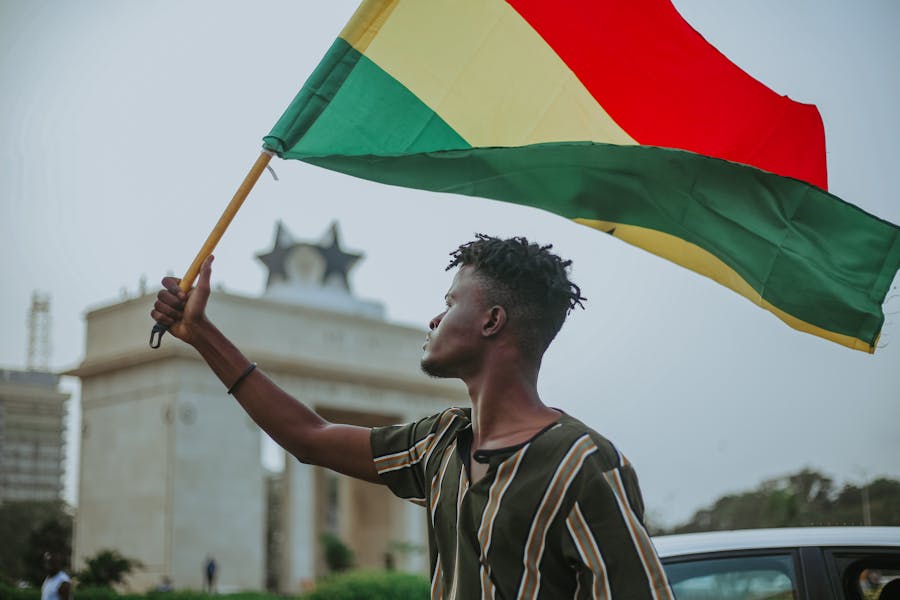ACCRA, Ghana (AP) — On Saturday, millions of Ghanaians will head to the polls in a crucial election that comes at a time when the nation faces its worst economic crisis in a generation. Once celebrated as a model of democracy and economic growth in West Africa, Ghana now grapples with skyrocketing inflation, soaring debt, and widespread unemployment, leaving many citizens yearning for leadership that can deliver tangible change.
With 18.7 million registered voters, the general election will determine the next president and 276 members of parliament. Yet, despite the high stakes, many Ghanaians express skepticism about whether the leading candidates can bring about the transformation the country desperately needs. The election pits Vice President Mahamudu Bawumia of the ruling New Patriotic Party (NPP) against former President John Dramani Mahama of the opposition National Democratic Congress (NDC). Though 12 candidates are in the race, the contest has again emerged as a two-horse race, characteristic of Ghana’s political history since its return to multiparty democracy in 1992.
Ghana’s challenges are stark. Inflation, which peaked at 54% late last year, has eased slightly but continues to strain household budgets. Last year, the government’s decision to default on most of its foreign debt exacerbated the economic crisis, triggering price hikes in fuel, food, and other essentials. Many citizens report little improvement in their living conditions, with market prices still far beyond reach for the average Ghanaian.
Environmental concerns have compounded economic hardships, particularly the issue of illegal gold mining, locally known as galamsey. As Africa’s top gold producer and the sixth-largest globally, Ghana’s mining sector should be a cornerstone of economic stability. However, rampant illegal mining has not only polluted rivers and degraded the environment but also highlighted the government’s inability to regulate the sector effectively. The practice has become a symbol of desperation in a collapsing job market and a key issue in the campaign, with both candidates promising tougher measures to address it.
Vice President Bawumia, a 61-year-old economist educated at Oxford and a former central bank deputy governor, has campaigned on a platform of economic stability and continuity. He promises to build on the outgoing administration’s efforts despite widespread criticism of the NPP’s inability to resolve the ongoing economic crisis. “Together, we can continue building Ghana’s future,” Bawumia declared at his final rally, urging citizens to trust in his expertise to steer the country out of turmoil.
His main challenger, John Mahama, 65, is seeking a comeback after being voted out of office in 2016 over unmet economic promises. Campaigning on a message of transformation, Mahama has vowed to “reset” the country across all sectors, including governance, agriculture, infrastructure, and healthcare. “It’s time to reset our democracy and economy,” he said during his final campaign speech, appealing to citizens frustrated by the current administration’s shortcomings.
Both the NPP and NDC claim distinct ideological identities, with the NDC leaning towards social democracy and the NPP presenting itself as center-right. However, analysts and voters point out that the candidates’ programs offer few significant differences, leaving many disillusioned and forced to choose between personalities rather than policies.
This disillusionment extends to the parliamentary race, where the ruling NPP and opposition NDC hold 137 seats in the 275-member legislature, with one independent member often siding with the NPP. Adding one more constituency in this election increases the total number of deputies to 276, further intensifying competition. Whichever party secures a majority will influence the next administration’s ability to govern effectively.
In the capital city of Accra, the pre-election atmosphere has blended festivity and anxiety. Campaign posters and billboards dominate the streets, while rallies and parades energize party supporters. Bikers perform stunts, election songs blare from loudspeakers, and political jingles echo through neighborhoods. Amid this lively display, however, there is a palpable concern about the country’s future. Many Ghanaians feel this election is about much more than party loyalty—it is a critical moment to address the nation’s pressing economic and environmental issues.
“I just want a leader who can fix the economy and give us jobs,” said Ama Osei, a 27-year-old graduate who has struggled to find employment since completing her studies. Her sentiments mirror the frustrations of a generation that feels left behind in the country’s economic decline.
Despite these challenges, Ghana’s democratic stability remains a source of pride for its citizens. Ghana has consistently demonstrated its commitment to peaceful elections and governance in a region plagued by coups and political instability. This reputation as a beacon of democracy is closely monitored by international observers, who hope the country will uphold its legacy even amid rising discontent.
As polling stations prepare to open, Ghana’s mood is cautious optimism. The outcome of this election will shape the nation’s trajectory at a time when the need for strong leadership has never been more urgent. Whether Bawumia’s pledge for stability or Mahama’s call for a reset resonates more with voters, the next administration will inherit an economy in crisis and a populace eager for change. The world watches as Ghana, despite its struggles, strives to reaffirm its status as a democratic leader in West Africa.


